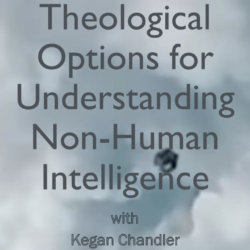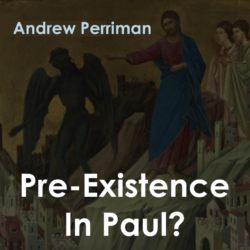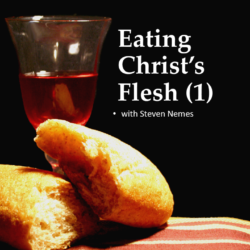Apologetics 13: Problem of Evil (Objection 1)
Now that we’ve established the existence of God, the historicity of Christ’s resurrection, and the bible’s veracity, we come to objections commonly brought against Christianity. The chief classical question posed to Christians throughout the eons is, “How can you believe in God when there is so much pain and suffering in the world?” Thankfully, the bible provides a range of answers to that question though, it’s not always clear which answer applies to a given situation. In what follows I address the logical argument against God’s existence before going on to cover 6 major reasons why God allows suffering, including: (1) the Fall, (2) the devil, (3) God’s judgments, (4) using suffering for good, (5) lack of faith, and (6) time and chance. Lastly, I explore some of what the scriptures teach us about dealing with suffering.
If you would like to take this class for credit, please contact the Atlanta Bible College so you can register and do the necessary work for a grade.
Notes:
The Problem of Evil
This is a serious problem
- I don’t have the problem of evil totally figured out, however this is the way I understand it right now. Your thoughts, doubts, and comments are appreciated.
- “The problem of evil is the most serious problem in the world. It is also the one serious objection to the existence of God. More people have abandoned their faith because of the problem of evil than for any other reason. It is certainly the greatest test of faith, the greatest temptation to unbelief. And it’s not just an intellectual objection. We feel it. We live it.” –Peter Kreeft[1]
outline
- show how this objection fails to disprove God’s existence
- explore reasons why God allows evil
- consider how to deal with suffering
1. How the POE Fails to Disprove God’s Existence
The problem stated and some possible solutions
- the problem of evil is “If there is a God then why is there so much pain and suffering?”
- Proof against God’s existence
- God is all-loving
- God is all-powerful
- Evil exists
- \There is no God
Some suggested solutions
- God is not all loving: He really can stop all evil but he doesn’t care enough about our puny lives to put forth the effort.
- he is distant (deists)
- hard predestination (you’re a worthless maggot to whom God owes nothing)
- molinism (God’s arranged the proper amount of suffering to maximize the number who would freely choose him)
- his focus is not on individual but the group (utilitarian)
- God is not all-powerful:
- Harold Kuschner: “God does not reach down to interrupt the workings of laws of nature to protect the righteous from harm. This is a second area of our world which causes bad things to happen to good people, and God does not cause it and cannot stop it”[2]
reformulating the proof
- proof
- God is all-loving
- God is all-powerful
- evil (still) exists
- God has not eliminated evil yet
- can’t prove God doesn’t have some reason(s) for allowing evil
- a world w/ minimal suffering might not be best from God’s perspective
- a world w/ constant gratuitous evil would probably crush people’s faith
- a world w/ lots of suffering, lots of beauty, lots of kindness would probably maximize the number of people who turn to God and freely choose to put their faith in him
evil points to a source of evil
- shouldn’t presume the absence of a source of good
- If there is evil then there is an ultimate source of evil
\the devil exists (1 Peter 5.8; Acts 10.38; John 8.44; 1 John 3.8) - all evil can be traced to the devil
- If there is good then there is an ultimate source of good
\God exists (Mat 19.17; Mark 10.18; Luke 18.19; James 1.17; 1 John 4.16)
barbershop story: A man went to a barbershop to have his hair cut and his beard trimmed. As the barber began to work, they began to have a good conversation and talked about so many things and various subjects. When they eventually touched on the subject of God, the barber said: “I don’t believe that God exists.”
“Why do you say that?” asked the customer.
“Well, you just have to go out in the street to realize that God doesn’t exist. Tell me, if God exists, would there be so many sick people? Would there be abandoned children? If God existed, there would be neither suffering nor pain. I can’t imagine a loving God who would allow all of these things.”The customer thought for a moment, but didn’t respond because he didn’t want to start an argument. The barber finished his job and the customer left the shop. Just after he left the barbershop, he saw a man in the street with long, stringy, dirty hair and an untrimmed beard. He looked dirty and unkempt. The customer turned back and entered the barber shop again and he said to the barber: “You know what? Barbers do not exist.”
“How can you say that?” asked the surprised barber.
“I am here, and I am a barber. And I just worked on you!”
“No!” the customer exclaimed. “Barbers don’t exist because if they did, there would be no people with dirty long hair and untrimmed beards, like that man outside.
“Ah, but barbers DO exist! That’s what happens when people do not come to me.”
“Exactly!” affirmed the customer. “That’s the point! God, too, DOES exist! Because people do not look to God for help is why there’s so much pain and suffering in the world.”
2. Reasons Why God Allows Suffering
1 the Fall
- 7x God calls creation good in Gen 1
- imagine a world w/o human suffering and death
- where God walks with people in the cool of the day
- w/ tree of knowledge of good and evil, he gave us free choice
- serpent inserted doubt that God didn’t really love Adam & Eve, but that he was holding them back
- God curses ground, man, woman, & satan
- the Fall explains why our world is so evil and yet good
- God did not make sin, addiction, disease, abuse, and death
- Tim Keller: “They are forces of darkness that were unleashed when we turned away from God. When we rebelled against God the fabric of this world began to unravel. We unleashed those forces.”[3]
- who’s fault was the Fall? satan and humanity
- sin spirals increasingly downward as wickedness compounds (e.g. Cain & Abel)
- Romans 5.12
12 Therefore, just as sin came into the world through one man, and death through sin, and so death spread to all men because all sinned - Romans 8.18-23
18 For I consider that the sufferings of this present time are not worth comparing with the glory that is to be revealed to us. 19 For the creation waits with eager longing for the revealing of the sons of God. 20 For the creation was subjected to futility, not willingly, but because of him who subjected it, in hope 21 that the creation itself will be set free from its bondage to corruption and obtain the freedom of the glory of the children of God. 22 For we know that the whole creation has been groaning together in the pains of childbirth until now. 23 And not only the creation, but we ourselves, who have the firstfruits of the Spirit, groan inwardly as we wait eagerly for adoption as sons, the redemption of our bodies.
- Romans 5.12
- we can trace every kind of suffering back to the Fall
- humans, accidents, natural disasters, biological, judgment, devil/demons
2 the devil causes evil
- 2 Corinthians 4.4: the god of this world blinds the minds of unbelievers to keep them from seeing the light of the gospel
- 1 Peter 5.8: the devil prowls around like a roaring lion, seeking someone to devour
- Job’s suffering
3 God’s judgments
- God does not leave the guilty unpunished
- about Sodom, the angels said, “For we are about to destroy this place, because the outcry against its people has become great before the LORD, and the LORD has sent us to destroy it.” (Genesis 19.13)
- C. Sproul story about us deserving judgment for sin (Rom 6.23)
4 God uses suffering for good
- translation discrepancy
- either “all work for good”
- or “God works all for good”
- Romans 8.28 [NASB]
And we know that God causes all things to work together for good to those who love God, to those who are called according to His purpose.
- Romans 8.28 [ESV]
And we know that for those who love God all things work together for good, for those who are called according to his purpose. - don’t want to say that God causes evil to teach us lessons, but he certainly does use it
- Joseph’s hardships
- for example, when tragedy strikes people run to God (remember 9/11/2001?)
- death can be a wakeup call for the living
- Ecclesiastes 7.2
It is better to go to the house of mourning than to go to the house of feasting, for this is the end of all mankind, and the living will lay it to heart.
5 sometimes people don’t get healing b/c of a lack of faith
- God generally requires faith for healing
- a man brought his son who had demonic seizures to disciples, but they couldn’t heal him (Mk 9.17-18)
- Mark 9.22-24
22 …But if you can do anything, have compassion on us and help us.” 23 And Jesus said to him, “‘If you can’! All things are possible for one who believes.” 24 Immediately the father of the child cried out and said, “I believe; help my unbelief!”
- Mark 9.22-24
- even Jesus couldn’t heal skeptics in Nazareth
- Mark 6.5
And he could do no mighty work there, except that he laid his hands on a few sick people and healed them. - Matthew 13.58
And he did not do many mighty works there, because of their unbelief.
- Mark 6.5
6 time and chance
- sometimes no moral agent causes suffering (God, angels, satan, demons, humans, etc.)
- things happen b/c of physical laws (falling tree branch, meteorite, lightning strike, hurricane, etc.)
- Ecclesiastes 9.11
Again I saw that under the sun the race is not to the swift, nor the battle to the strong, nor bread to the wise, nor riches to the intelligent, nor favor to those with knowledge, but time and chance happen to them all. - tower doesn’t fall on people b/c they are more sinful than the rest
- Luke 13.1-5
1 There were some present at that very time who told him about the Galileans whose blood Pilate had mingled with their sacrifices. 2 And he answered them, “Do you think that these Galileans were worse sinners than all the other Galileans, because they suffered in this way? 3 No, I tell you; but unless you repent, you will all likewise perish. 4 Or those eighteen on whom the tower in Siloam fell and killed them: do you think that they were worse offenders than all the others who lived in Jerusalem? 5 No, I tell you; but unless you repent, you will all likewise perish.”
- Luke 13.1-5
- unknown reasons (7.5 billion chess pieces)
3. How to Deal with Suffering
two ways ppl respond to suffering
- “Why is God punishing me?” (moralism)
- what am I doing wrong?
- maybe I need to go to church more?
- maybe I need to pray more?
- assumption: if I live a good life then good things will happen to me (this is really just karma)
- cynicism
- randomness of life
- life is a crapshoot, stuff happens
- this proves there is no God
- or he’s incompetent
- or indifferent
- or too weak
- if God allows this kind of evil and suffering then I don’t want anything to do with him
these are both pat answers
- they keep you in control
- the cynic says, “I can live however I want since God isn’t going to do anything”
- the moralist says, “If I live this way, God has to bless me”
- both are ways to get control of the situation
- is it possible to live w/ the uncertainty and be in a relationship with a God you can’t control?
embrace living w/o an answer to the why question (Tim Keller)
- learning to love God for God not for what God gives you
- this was Satan’s accusation against Job
- this was Abraham’s great test
- if you know why you have suffering then you won’t become the kind of person suffering can make you.
Kim Walker: “I had some different challenges that I walked through in my childhood. When I formed my relationship with God and found out how big and how powerful He is, I suddenly could not fully understand why did all the bad things happen? God, in all His power, He’s so big, He’s so strong. He could have done something to stop it right? And going and saying ‘but God, why did all the bad things happen?’ I’ve gone and talked to lots of people over the years when I start talking about this. People who have gone through trauma or loss and different things and they have that same question burning inside of them, the ‘why?’. And to be quite honest, I didn’t really hear it talked about a lot in church, or anywhere because I don’t know if people just didn’t have a great answer. But I realized at some point that this is what was happening; I could only get so close to God. I was so hungry for Him, but because my heart, I was living with this offense in my heart. This offense that He didn’t look how I wanted Him to look and He didn’t show up how I wanted Him to show up. He didn’t even show up when I wanted Him to show up. And I just couldn’t understand, I still had that question burning ‘why did all the bad things happen?’
Suddenly, when this revelation hit me, I realized that this thing, this offense was standing between me and Him and was preventing me from getting closer to Him. It’s like I hit this breaking point where I was so desperate to be closer in His presence, that I just hit this moment of breaking down and said ‘God, I want you more than I want the answers.’ And it took me a long time to get there and it was a fight. And if I’m really honest with all of you today, that is still something I do every day. Every day I still say, ‘God, I want you more than I want the answers’. Even though I don’t understand, He and I may have some long conversations when I get to [the kingdom of] heaven, but right now I cannot have any offense in my heart. I cannot afford to carry anything in my heart that would stand in between me and His presence. I had to make that sacrifice, to lay it down and to put it aside and to say ‘God, my hunger for you far outweighs my hunger for understanding, or for the answers, or to have it all perfectly clear in my head.’”
The Solution
- mighty not be able to explain why God allows certain seemingly meaningless suffering
- but we do offer a solution to the problem of evil
- what’s the alternative?
- there’s no purpose
- tough luck
- stuff happens
- buck up, keep a stiff upper lip
- or, suffering is an illusion (Buddhism)
- the solution has two phases to it, based on the two advents of Christ
- Phase One: the cross (Hebrews 2.14)
- God has done something to solve the problem of evil
- Christ had his most ardent prayers denied (Garden of Gethsemane)
- through Christ God endured unimaginable suffering
- he lost a child
- Christians can live as Christ did, above the standards of this PEA (Galatians 1.4). Much evil can be avoided if we just live by the two great commandments (1) Love God with Everything (2) Love others as Christ loved the disciples
- Phase Two: the kingdom restoration (Acts 3.21)
- human evil=>solved partially when one is born again and then completely when one is resurrected. (2 Peter 3.12-13)
- Accidents=>humans will be immortal (i.e. cannot die) (1 Corinthians 15.52-53) furthermore, we will be walking by the new spirit poured out into our transplanted hearts (Jeremiah 31.33-34; Ezekiel 36.25-28)
- Natural Disasters=>solved when the sky and earth are revamped to a paradise state (i.e. New heavens and earth) (Isaiah 65.17; 66.22; Romans 8.19-22; 2 Peter 3.13; Revelation 21.1).
Biological Evil=>solved by resurrection—imperishable, immortal, perfect bodies especially suited to glorifying God (1 Corinthians 15.52-54) - Judgment=>all sin will cease in the kingdom so there will be no need for judgment. The last act of judgment is recorded in (Revelation 20.10-15)
- Devil/demonic evil=> God has plans to destroy him and he will be thrown into the lake of fire (Revelation 20.10).
- Some evil can be destroyed today as we walk by the spirit, most will be destroyed when Christ returns
If someone asks you, “Why is there evil?” You can answer, “Because God loves you.” The truth is that He is longsuffering, not wanting any to perish (2 Peter 3.9). God is suffering too! There is a sense in which God is not reigning (Revelation 11.15-17). The devil has authority over the nations of this age (Luke 4.5-6). The Lord’s Prayer asks for God’s will to be done on earth as it is in heaven (Mat 6.10). This means that in heaven, God’s will is done, but on earth, it will not be done until the kingdom comes. Evil will be destroyed, piece by piece (Revelation 20.2, 10), but not yet so that more can be a part of the kingdom. God is the only one who knows when the end will come (Mark 13.32).
- Don’t deny evil (psalms of disorientation, i.e Psalm 88; 37)
- God suffers with us; we are not alone (Hosea and Gomer)
- God knows what it is like to lose a son! (John 3.16)
- Hope, living hope! (Revelation 21.1-7)
We may not have the answer to why God allows this or that to happen. However, we can provide people with the ultimate solution—the kingdom of God (when God makes everything wrong with the world right).
Habakkuk 1.1-4; 3.16-19…need to trust in God through our suffering
Psalm 37 instructs us how to deal with evil
[1] “The Problem of Evil.” Chapter 7 in Fundamentals of the Faith. (San Francisco: Ignatius Press, 1988), 54-58.
[2] Harold Kuschner, When Bad Things Happen to Good People (NY: Anchor Books, 1981), p. 67.
[3] Tim Keller, “Questions of Suffering,” sermon Jan 6, 2008 at Redeemer Presyterian Church, in series “Job—A Path Through Suffering.” Gospel in Life podcast. accessed 12/7/2016.







How refreshing to hear you say, you don’t have the problem of evil totally figured out; now we can relax and look into Holy Scripture and try and work out what we can know and take it from there, and continue learning about this most serious subject which has caused so many to doubt the existence of a loving God.
What we do know for sure is that pain and suffering is not OK, it’s not OK with God or with Jesus Christ; the certainty for that is the ransom sacrifice – God allowed His only begotten son to suffer and die in our behalf, and this He did at great cost to Himself. Jesus took up our pain and bore our suffering (Isa 53).
When Adam and Eve listened to Satan, and disobeyed God, it cost them and all their offspring dearly – sin and death entered into the world; the land became cursed, they lost rulership of the land, and their relationship with God. Satan was now able to exercise enormous influence over man and his world (1 John 5:19). He is the God of this present evil age (2 Cor 4:4). But thankfully – as one of our brothers put it, “What God originally intended in the beginning, he is going to bring about in the end.” Gen – Rev. (Mark 1:14,15; Matt 24:14).
What about a Christian’s personal pain and suffering? It’s how we grow (1 Pet 1:6,7). It’s through all that pain and suffering that we finally “grow up.” Through prayer, study and endurance we build spiritual stamina and learn how to break through the pain barrier. We reach out to our God and Father, and follow closely in the footsteps of our King and brother, Jesus Christ (1 Pet 2:21-25).
This was a solid class with great information, thanks for sharing this! I had never heard the “Barbershop” parable before, but now, given the opportunity, I won’t hesitate to share it. Also, thank you for taking the time to respond to my comment on OffScript 17, while I wasn’t trying to be controversial , or trying to humble you, I found your response refreshing compared to the usual responses I receive when I mention those issues. Thanks again!
I am always encouraged by the “meekness and fear” that is consistently displayed in these Restitutio pod casts. Nowadays, too many so called “mature Christians” on the internet, and in pulpits across the world, arrogantly present their views as indisputable truths. They refuse to consider that they might be wrong. Their obvious goal is to convince you they are right and if you do not agree with them you are wrong. Your series on Apologetics has given me a renewed appreciation for how to effectively speak in defense of my beliefs in a manner that shows a willingness to listen to all reasonable objections with an honest disposition that I might still be wrong. Doing that always takes me (and should take anyone else) back to scripture, and back to a reverence and respect for God, which is the beginning of knowledge and wisdom. Keep up the good work!
One thought on the issue of control. I think that point is spot because everything in our life is effected by this issue of control. As you said, we can talk for hours about this issue because each of us is sorting our thoughts under our individual efforts to control our thoughts. No one enjoys a loss of control. At the fall, this natural inclination to be in control is what drove Eve then Adam to rebel against God to begin with. I commented at length on that issue in response to the podcase “Are we guilty of Adams sin?” so I won’t go down that rabbit trail again. We just need to surrender and trust Jesus, since God put all things under Him and made Him our Lord.
As I listened to this podcast I was reminded of a song my Mom taught us kids entitled, “Thank You for the Valley”. I hope it will be a blessing to someone. Here are the lyrics.
Verse 1
Thank you for the valley I walked through today
The darker the valley, the more I learned to pray
I found you were the lily, blooming beside the way
So, I thank you for the valley I walked through today.
Chorus
Thank you for every hill I climbed, for every time the sun didn’t shine.
Thank you for every lonely night, I prayed ‘till I knew everything was all right.
So, I thank you for the valley I walked through today.
Verse 2
Life can’t be all sunshine or the flowers would die
All the rivers would be desert all barren and dry
Life can’t be all blessing or I’d feel no need to pray
So, I thank you for the valley I walked through today.